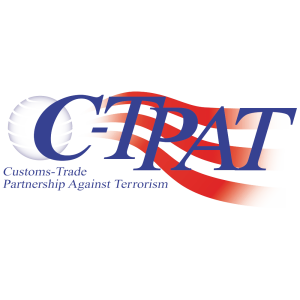
What is C-TPAT?
C-TPAT is but one layer in U.S. Customs and Border Protection’s (CBP) multi-layered cargo enforcement strategy. Through this program, CBP works with the trade community to strengthen international supply chains and improve United States border security.
C-TPAT is a voluntary public-private sector partnership program which recognizes that CBP can provide the highest level of cargo security only through close cooperation with the principle stakeholders of the international supply chain such as importers, carriers, consolidators, licensed customs brokers, and manufacturers. The Security and Accountability for Every Port Act of 2006 provided a statutory framework for the C-TPAT program and imposed strict program oversight requirements.
C-TPAT Partners have worked cooperatively with CBP to protect their supply chains from the introduction of all types of contraband, and global supply chains are more secure today as a result of the program. In exchange, CBP provides Partners reduced inspections at the port of arrival, expedited processing at the border, and other significant benefits, such as “front of the line” inspections and penalty mitigation.
C-TPAT Partners enjoy a variety of benefits, including taking an active role in working closer with the U.S. Government in its war against terrorism. As they do this, Partners are able to better identify their own security vulnerabilities and take corrective actions to mitigate risks. Some of the benefits of the program include:
- Reduced number of CBP examinations
- Front of the line inspections
- Possible exemption from Stratified Exams
- Shorter wait times at the border
- Assignment of a Supply Chain Security Specialist to the company
- Access to the Free and Secure Trade (FAST) Lanes at the land borders
- Access to the C-TPAT web-based Portal system and a library of training materials
- The possibility of enjoying additional benefits by being recognized as a trusted trade Partner by foreign Customs administrations that have signed Mutual Recognition with the United States
- Eligibility for other U.S. Government pilot programs, such as the Food and Drug Administration’s Secure Supply Chain program
- Business resumption priority following a natural disaster or terrorist attack
- Importer eligibility to participate in the Importer Self-Assessment Program (ISA)
- Priority consideration at CBP’s industry-focused Centers of Excellence and Expertise
The UWL Team of Experienced Compliance Specialists
Partner with trusted advisors to navigate the challenging requirements of shipping regulations. Our team of in-house compliance specialists will design effective compliance strategies to simplify the complex regulatory system. UWL will help you comply with existing industry and government regulations and stay ahead of changing compliance laws.
For more information about the C-TPAT program and how to become a C-TPAT partner, please visit www.cbp.gov and www.dhs.gov.

- C-TPAT Certified
- FMC Ocean Transportation Intermediary (OTI) License
- FMCSA Broker Authority
- U.S. Customs Brokerage License
- National Customs Brokers & Forwarders Association of America (NCBFAA)
- Transportation Worker Identification Credential (TWIC)
- Kosher Certified Flexitanks
- IAC (Indirect Air Carrier)
- IATA (International Air Transport Association)
- WCA Network